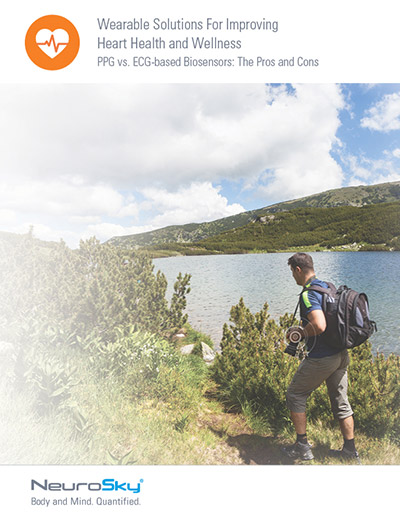As health and fitness becomes more top of mind for consumers, and biosensor technology continues to evolve and improve, the demand for wearable and mobile tools is steadily increasing. Specifically, tracking health and fitness through heart rate variability (HRV) can help users obtain a better understanding of their bodies. The valuable data wearable and mobile devices can provide is enabled by ECG biosensors and their accompanying algorithms. This post will provide a closer look at ECG algorithms, and the possibilities they provide for devices and their users.
What is an ECG Algorithm?
ECG (electrocardiography) tracks the the electrical activity of the heart. When incorporated in a wearable device, often worn on the wrist, an ECG sensor such as NeuroSky’s CardioChip is capable of taking incredibly precise measurements.
While the ECG sensor captures the data, it’s the wide assortment of ECG algorithms that help to make the data useful to the user. NeuroSky’s biometric algorithms for the ECG CardioChip are designed to take the data collected, and make it actionable. By tracking detailed health measures like HRV, algorithms enable wearable and mobile devices’ ability to provide insight into a variety of health and fitness indicators.
What Can ECG Algorithms Track?
ECG algorithms track HRV, which has the power to provide wearable users with a wide assortment of information on their bodies, including:
- Heart Age – Tracking heart age allows users to better understand how their heart is functioning compared to a relative age (either older or younger). This is based on overall fitness levels, HRV levels, and actual age. As a user’s heart age improves, the algorithm is able to show the extent of the benefits associated with a proper fitness program combined with favourable lifestyle choices.
- Stress – Tracking physiological stress is an excellent way to better understand how the body reacts to certain situations. Chronic stress is known to be a predictor of future health problems, so being aware of how and when they occur can empower wearable users to take steps toward managing stress.
As ECG algorithms continue to advance, NeuroSky will continue to offer exciting new algorithms for wearable creators to leverage to track health data, including:
- Breathing Index/Respiration Rate – This algorithm will track average number of breaths taken per minute, enabling wearable users to evaluate respiratory health.
- Fatigue – Using a derivative of HRV levels, this algorithm will be able to track body fatigue levels. Tracking fatigue can better help individuals training— athletes and otherwise—to plan exercise and intensity to improve performance or maintain positive overall health.
ECG algorithms are crucial for transforming your wearable from a stylish accessory to a powerful health and wellness tool. For more information on how ECG algorithms can enable your wearable and mobile devices, be sure to download the free whitepaper, Wearable Solutions For Improving Heart Health and Wellness.



